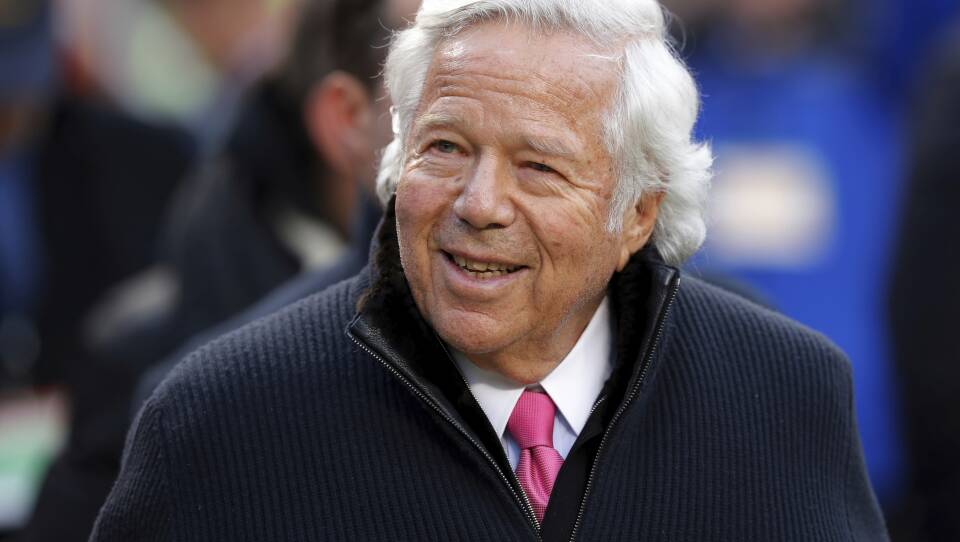Patriots owner Robert Kraft is facing two misdemeanor counts of soliciting prostitution for allegedly paying a prostitute for sexual services at a spa in Jupiter, Florida. Kraft is among 171 men charged with solicitation after police completed a months-long investigation into multiple spas that officials say were running a human trafficking ring. Kraft has denied the charges through a spokesperson, but police say they have video evidence of Kraft engaging in a sex act with a masseuse after paying her cash. He is due in court on April 24. WGBH's Morning Edition Host Joe Mathieu spoke with Northeastern Law Professor and WGBH Legal Analyst Daniel Medwed about the charges' ramifications for Kraft.
Joe Mathieu: First, what are the precise charges and what punishment is Kraft actually facing?
Daniel Medwed: The state's attorney for Palm Beach County formally filed two counts of the crime of soliciting, inducing, enticing or procuring another to commit prostitution. That's a first-degree misdemeanor in Florida, punishable up to one year in jail, a $5,000 fine, 100 hours of community service and a mandatory class on the hazards of human trafficking. Now I would be shocked — or maybe surprised — if Kraft ever spent a day in jail, given that this is a first-time offense. But it's very hard to predict how the prosecutors will treat this, given its high profile nature, a case of this magnitude. We should know more by arraignment which is on April 24.
Mathieu: And he could also face serious punishment from the NFL, right, as a separate matter?
Medwed: Absolutely. The criminal law consequences may be pale in comparison to the collateral consequences, the damage to his reputation and his standing in the NFL. Under the NFL guidelines, the commissioner has vast discretion to impose discipline for any conduct that "is detrimental to the integrity of or public confidence in the NFL." And we have some comparisons here, some precedent. About five years ago the Indianapolis Colts owner pleaded guilty to driving while intoxicated. The commissioner gave him a $500,000 fine and a six game suspension. So perhaps Kraft is facing punishment in that general range.
Mathieu: Interesting. Now, he claims to be innocent. Kraft says he denies all the charges. But we've got video evidence, according to authorities. Is there any chance the charges could be dropped or that he's acquitted?
Medwed: I'm going to go out on a limb — no chance. Almost no chance. First and foremost, as you mentioned, the video evidence. This arrest and the charges were part of a larger sting operation in which the Jupiter, Florida police installed secret cameras in this massage parlor that captured footage of illicit activity, including, apparently, two sex acts by Kraft in exchange for money. That's pretty ironclad evidence. Now his lawyers undoubtedly will try to suppress, exclude that evidence on Fourth Amendment grounds. They're going to say it was part of an illegal search and seizure and shouldn't come into evidence. I think that's a losing argument. Everything I've seen indicates that the police went by the book in this sting operation, and I suspect Kraft's claims of innocence will fall on deaf ears. Second, let's consider the public relations angle here. Every day he claims to be innocent, every day he marches inexorably toward trial, that's another day in the headlines. If I were his lawyer I would try to resolve this quickly, if not quietly, maybe plead it out to a second-degree misdemeanor and move on.
Mathieu: We're talking with WGBH News Legal Analyst Daniel Medwed. Of course, the most troubling piece of this saga is that the massage parlor might have committed human rights violations. We're hearing a lot of references to sex trafficking. What does that mean in terms of this case broadly?
Medwed: Well, on the one hand that's exactly right. This case is about a lot more than solicitation. There are rumors swirling around about sex trafficking [and] human rights violations. Those rumors are being fueled by the police who are issuing statements about the deplorable conditions in which these women lived and worked. Apparently several folks with ties to China were arrested last week and charged with far more serious offenses. But on the other hand, it's very difficult to charge a patron of a prostitute, a john, with one of these more serious offenses. Even if you proceed under an accomplice theory, and you claim that the patron aided or abetted the criminal enterprise by providing financial support by paying for these sexual services, it's very challenging to show that they had what's called the culpable mental state, that they had the intent to promote sex trafficking or something like that. But nevertheless, what's very important about this case [is] it raises some significant existential and policy questions. To what extent do patrons of prostitutes, especially in this type of context, know or have reason to know that they're not engaging in sexual liaisons with consenting adults who are doing this for money, but with people who've been coerced, enslaved into the industry? Even more, to what extent should men be punished for turning a blind eye to these injustices? Those are important questions.




